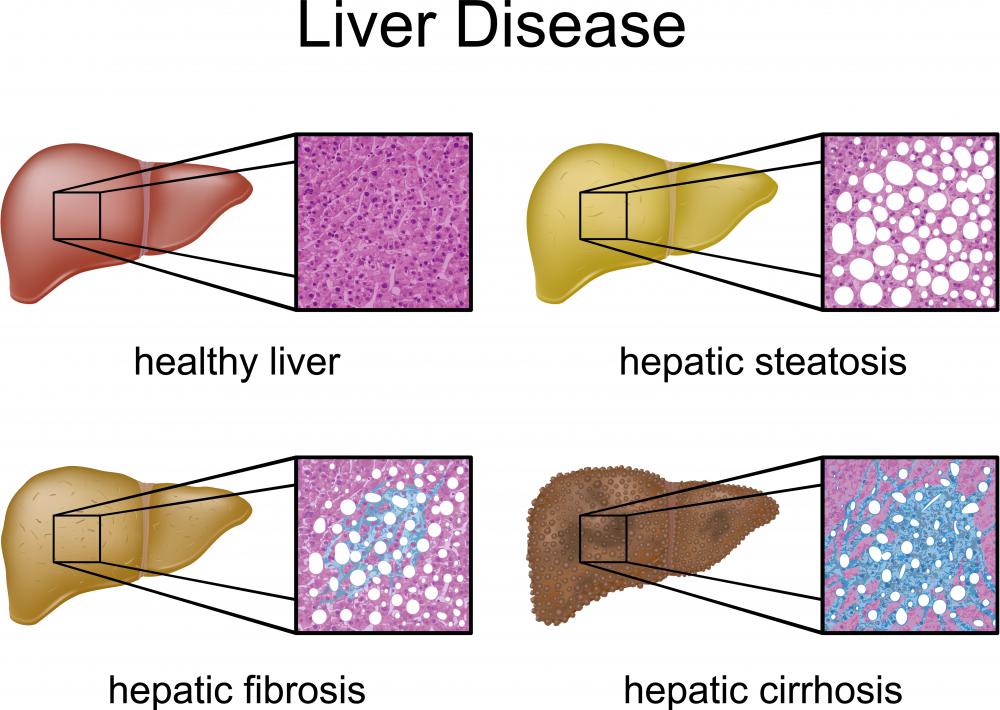At WiseGEEK, we're committed to delivering accurate, trustworthy information. Our expert-authored content is rigorously fact-checked and sourced from credible authorities. Discover how we uphold the highest standards in providing you with reliable knowledge.
How are Cirrhosis and Hepatitis Related?
Cirrhosis and hepatitis are related in that the various forms of hepatitis commonly lead to cirrhosis of the liver. Cirrhosis occurs with the development of scar tissue and nodules on the liver, which impair function mainly by decreasing blood flow. Hepatitis occurs when the liver becomes inflamed, either from a virus or due to toxic consumption of substances such as alcohol and drugs. Over time, chronic inflammation can damage the liver with scarring, leading to cirrhosis. Complications from cirrhosis often prove fatal.
Cirrhosis can be caused by most forms of hepatitis, particularly types B (HBV) and C (HCV). There is also hepatitis D (HDV), a subset of HBV, which can also cause cirrhosis. In most cases, cirrhosis and hepatitis are caused by chronic viral hepatitis. It is sometimes possible for acute viral hepatitis—such as that brought on by hepatitis A—to contribute to cirrhosis, especially when coupled with other factors such as excessive alcohol consumption.

Cirrhosis and hepatitis can also be caused by nonalcoholic fatty liver disease (NAFLD), a condition in which someone who isn't a heavy drinker develops liver complications that are similar to those caused by alcohol consumption. NAFLD usually appears in people with obesity and diabetes. It can lead to nonalcoholic steatohepatitis (NASH), a type of hepatitis which can lead to cirrhosis. Many people with obesity and diabetes develop NAFLD, and most of those cases are able to be managed so that cirrhosis and hepatitis do not develop.

Cirrhosis and hepatitis also sometimes develop as a result of autoimmune hepatitis. Autoimmune hepatitis occurs when the body's immune system turns on itself, causing liver inflammation. Most cases of autoimmune hepatitis result in many complications, but not usually cirrhosis.
HBV is contracted by passing bodily fluids from one person to another. Once the virus is contracted, it attacks the liver and uses it as a breeding ground. Transmission can happen through the blood—by blood transfusion or needle sharing—sexual contact, or it can be passed from mother to infant during childbirth. HBV can become either an acute or chronic infection. With acute HBV, the body is able to flush out the virus within six months. Chronic HBV is an infection which becomes a lifelong condition; it often leads to cirrhosis and other complications.
HCV is transmitted through the blood, which most commonly happens with shared needles. Transmission also can occur through blood transfusion, though that happens far less due to modern blood-screening technologies. It may also be passed through childbirth, and in rare cases, through sexual contact. HCV often doesn't exhibit any symptoms until serious liver damage such as cirrhosis is detected, making it one of the deadliest hepatitis viruses.
AS FEATURED ON:
AS FEATURED ON:












Discuss this Article
Post your comments